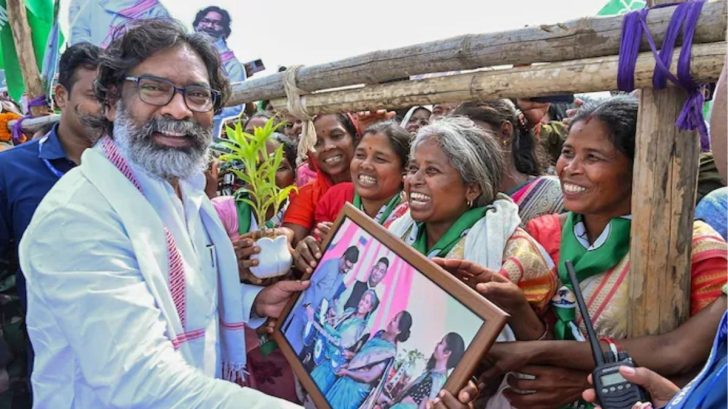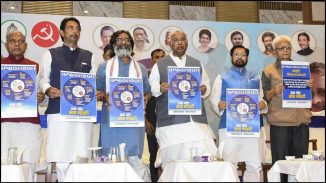The 2024 Jharkhand Assembly elections are now ongoing, with Chief Minister Hemant Soren’s party, the Jharkhand Mukti Morcha (JMM), concentrating on tribal rights and welfare as its primary priority.
However, another question remains whether the party, which claims to be the strong voice of the indigenous population, really has made an important impact in their lives during its time in power.
Key pledges and plans announced by the Hemant Soren administration, including the ‘Abua Awas Yojana’ (Our Housing Scheme), land rights, education, healthcare, and employment opportunities, are under scrutiny. Has the tribal community benefited from these initiatives? The BJP expressed concerns about the Abua Awas Yojana in particular, accusing the JMM government of corruption and incompetence.
BJP’s Attacks on Abua Awas Yojana
Himanta Biswa Sarma, BJP’s co-in-charge for Jharkhand, criticized the effort, saying, “The Jharkhand government’s Abua Awas Yojana is turning into a Babu Awas Yojana.” “No one can obtain a house without spending bribes.”
झारखण्ड सरकार की ‘अबुआ योजना’ ‘बाबू योजना’ बन गई है। जब तक घूस नहीं देंगे, तब तक मकान नहीं मिलेगा।@BJP4Jharkhand pic.twitter.com/C5RAJr8Bdy
— Himanta Biswa Sarma (@himantabiswa) November 16, 2024
Aim and Actuality of Abua Awas Yojana
On August 15, 2023, the Abua Awas Yojana was inaugurated, promising to offer permanent housing to more than 2.5 million Jharkhand citizens. Beneficiaries were promised a three-room house for ₹2 lakh, aimed at providing safe and inexpensive housing for indigenous populations. However, on the ground, the situation is bleak. According to reports, tribal beneficiaries frequently face challenges, including being forced to pay bribes in order to profit from the plan.
अबुआ आवास योजना की समीक्षा के दौरान मुख्यमंत्री श्री @ChampaiSoren का निर्देश :-
● अबुआ आवास योजना के तहत पहले चरण में स्वीकृत किए गए 2 लाख आवास और इसकी पहली किस्त की राशि जारी होने के उपरांत आवास निर्माण के प्रगति की जानकारी ली तथा इसमें तेजी लाने का निर्देश दिया। (1/3) pic.twitter.com/oMRRjMVrgO
— Office of Chief Minister, Jharkhand (@JharkhandCMO) June 12, 2024
While government data indicates that hundreds of indigenous households have gotten houses through the system, openness is limited. The official website does not provide detailed statistics on completed houses.
The government has committed to providing accommodation for all homeless and vulnerable families by 2026. However, concerns persist regarding how many homes have been built thus far.
Bribery and charges of mismanagement.
Corruption has surfaced as a key impediment to the implementation of the Abua Awas Yojana. Many indigenous families have claimed needing to pay bribes to local officials, contractors, and village elders in order to get their housing funds approved or construction started sooner. Without these payments, progress stalls, leaving beneficiaries in the lurch.
पीएम आवास योजना मिलने के बावजूद पीड़ित व्यक्ति ने हेमंत सोरेन के अधिकारियों को 10 हजार रुपए घूस नहीं दिया तो, क्षुब्ध अधिकारियों ने आवास किसी अन्य को स्थानांतरित कर दिया l
हेमंत पिछले 4 सालों से झारखंड में अबुआ आवास का ढिंढोरा पीट रहे हैं l अब तक एक भी व्यक्ति को अबुआ आवास नहीं… pic.twitter.com/hsw3tEN2ci
— Babulal Marandi (@yourBabulal) November 24, 2023
According to ground reports, tribal households are dissatisfied with the lengthy bureaucratic processes and are obliged to pay bribes at every stage. Despite the government’s assurances of speed and efficiency, the scheme’s impact has been negligible, with corruption and administrative incompetence undercutting its goals.
Governmental incompetence and disregard for rights.
The Abua Awas Yojana is likewise plagued by complaints of administrative ineptitude. Transparency is virtually non-existent, and beneficiaries frequently complain of a lack of information about the plan. Many people face lengthy delays as a result of extensive documentation and red tape. This not only violates human rights, but also casts doubt on the government’s ability to follow its promises.
Are Tribal Peoples Truly Motivated by Hemant Soren’s Government?
Hemant Soren’s government has repeatedly announced programs to improve tribal welfare. However, delivery on these pledges has fallen short. Instead of profiting, tribal tribes are frequently forced to pay bribes in order to gain access to their legal privileges. This has resulted in widespread disenchantment and animosity among native communities.
रोटी, कपड़ा, मकान के साथ आज की जरूरत है बिजली, इंटरनेट, शिक्षा एवं सड़क एवं स्वास्थ्य
आपकी अबुआ सरकार ने बिना किसी जाति, बिना किसी धर्म, बिना किसी अमीरी-गरीबी के आंकड़ें देखे बिना – सभी झारखंडी के लिए –
✅ रोटी – 11 लाख राशन कार्ड धारकों से संख्या बढ़ाकर 40 लाख परिवारों को… pic.twitter.com/M3xYrL7ikp
— Hemant Soren (@HemantSorenJMM) November 8, 2024
The Abua Awas Yojana is not the only scheme under review; other initiatives, like as land acquisition rules and job programs, have also been criticized. Many indigenous families believe that rather than addressing their issues, the government has exacerbated their hardships.
Increasing Dissatisfaction in Tribal Communities
Under the Hemant Soren government, indigenous people have grown more dissatisfied, with unmet demands and promises sparking protests and rallies. Many believe that the government has failed to protect their rights and is exploiting their concerns for political benefit.
Political Effect of Jharkhand Polls
As the Jharkhand polls advance, these unresolved concerns will have a big impact on JMM’s fate. Will indigenous groups continue to trust JMM as their voice, or will they see it as another failed political tool? The election results will be a key indicator of the party’s ability in resolving tribal concerns and keeping its pledges.




